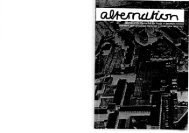Re-reading The Purloined Letter - Alternation Journal
Re-reading The Purloined Letter - Alternation Journal
Re-reading The Purloined Letter - Alternation Journal
You also want an ePaper? Increase the reach of your titles
YUMPU automatically turns print PDFs into web optimized ePapers that Google loves.
373<br />
<strong>Re</strong>-<strong>reading</strong> <strong>The</strong> <strong>Purloined</strong> <strong>Letter</strong><br />
If Dupin is in effect the Queen’s ‘analyst’ (or the ‘analyst’ of her dilemma),<br />
as with any other act of analysis for Lacan, this is not necessarily because of<br />
any knowledge he has of the letter or the actors in the primal scene. Dupin as<br />
analyst doesn’t ‘cure’ the situation because he has a certain knowledge, but<br />
because of the position he occupies in the chain of repetition. Felman<br />
(1980:147) states:<br />
By virtue of his occupying the third position—that is, the locus of<br />
the unconscious of the subject as a place of substitution of letter for<br />
letter (of signifier for signifier)—the analyst, through transference,<br />
allows at once for a repetition of the trauma, and for a symbolic<br />
substitution, and thus affects the drama’s denouement.<br />
It is not then what the analyst knows which facilitates the analysis, but his<br />
position as activator of a repetition of the original problem—his occupancy<br />
of a position which facilitates transference. Marie Bonaparte’s (1949:102)<br />
technique was the opposite of this, based on ‘cracking the code of authorial<br />
desire’. She also urges that analysis should not be the work of the author,<br />
who must ideally remain ignorant of and somehow separate from the<br />
processes and images buried in his text for fear of censoring their guilty,<br />
libidinal parts:<br />
Of all the devices employed by the dreamwork, that of the<br />
displacement of psychic intensities … is the most freely used in the<br />
elaboration of works of arts, doubtless because such displacement is<br />
generally dictated by the moral censor, which is more active in our<br />
waking thoughts than in sleep. <strong>The</strong> conceiving and writing of<br />
literary works are conscious activities, and the less the author<br />
guesses of the hidden themes in his works, the likelier are they to be<br />
truly creative (in Muller & Richardson 1988:645).<br />
Williams (1995:58) feels that analytic mastery, which keeps the<br />
writer from direct access to parts of himself and ensures that access takes<br />
place via the analyst, is thus necessitated by the analysand’s (here, the<br />
author’s presumed desire to self-censor, were he to ‘know’ the truth about<br />
himself). Lacan reads the situation differently, however, and not through the

















